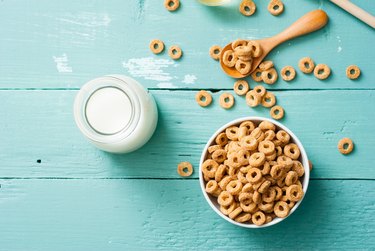
A bowl of Cheerios with milk is often seen as a healthy breakfast option. Compared to other sugary cereal brands, Cheerios are lower in calories and more nutritious. Adding milk increases the calorie count in a bowl, but it also adds more nutrition.
Cheerios Calories and Nutrients
Video of the Day
Original Cheerios are made with whole oats. These grains are gluten-free. There's also some corn starch, sugar, salt and vitamin E on the ingredients list, as well as various vitamins and minerals.
Video of the Day
A serving size of Cheerios (uncooked) amounts to 1 cup, which provides 100 calories. Of those 100 calories, 15 come from fat, according to the Cheerios nutrition label. There are 2 grams of fat, including 0.5 grams of saturated fat, 0.5 grams of polyunsaturated fat and 0.5 grams of monounsaturated fat, in each serving.
Cheerios are mainly a source of carbohydrates, which is where the bulk of its calories come from. There are 20 grams of carbs in a bowl of Cheerios. Those 20 grams include 3 grams of dietary fiber, 1 gram of soluble fiber and 1 gram of sugar. There are also 3 grams of protein per serving.
If you add half a cup of skim milk, the total calorie count goes up from 100 to 146 in one serving. The skim milk adds 4 grams of protein, no fat and 5.5 grams of carbohydrates. Skim milk has no fat, but it is typically less flavorful than its whole counterpart. As you add fat to milk, the calorie count increases. Each gram of fat adds 9 calories, according to the United States Department of Agriculture.
Half a cup of 1 percent fat milk brings the total calorie count up to 155 calories in a bowl of Cheerios. There's an additional gram of carbohydrates and 1.25 grams of fat. The same amount of 2 percent milk raises the calorie count to 170. There are 2.5 grams of fat in half a cup of 2 percent milk.
Finally, a half cup of full-fat milk adds 75 calories to your bowl of Cheerios, bringing the total calorie count up to 175. In milk that hasn't had any fat removed, fat makes up about 3 to 4 percent of the total content. There are 6.5 grams of fat in half a cup of whole milk and 16.5 grams of carbohydrates.
While 230 calories may or may not seem like a lot, remember that most of those calories come from milk. Original Cheerios are actually relatively low in calories. They remain one of the healthier breakfast cereal options since many other brands are high in sugar.
Comparing Cheerios to Sugary Cereals
A popular breakfast cereal, Kellogg's Frosted Flakes, has 147 calories per cup without milk. However, it has almost 10 grams of sugar, compared to 1 gram in a bowl of Cheerios. There's also less fiber and less protein in this sugary cereal.
While the calorie count is only slightly higher, the nutritional value of Frosted Flakes is low compared to that of Cheerios. The extra fiber, protein and fat in Cheerios without the added sugar will help you if your goal is to eat a more well-rounded diet.
The key difference between Original Cheerios and many other brands is their use of whole grains without adding a significant amount of added sugar. Excess sugar intake is linked to dental problems, obesity and type II diabetes, according to a July 2016 study published in Current Opinion in Clinical Nutrition and Metabolic Care. Eating too much sugar may also raise your blood pressure and lead to heart disease.
According to an April 2016 study published in the American Journal of Clinical Nutrition, increasing whole grain consumption may protect against myocardial infarction. Researchers noted that the best grains were rye and oats due to their high fiber content.
A good policy is to get at least half of your total grains for the day from whole grain sources. Eating a bowl of Cheerios in the morning will help you toward that goal.
- Nutrition Journal: "Whole Grain Consumption Trends and Associations With Body Weight Measures in the United States: Results From the Cross Sectional National Health and Nutrition Examination Survey 2001–2012"
- USDA Branded Foods Database: "Frosted Flakes"
- USDA Branded Foods Product Database: "2% Milk Fat Reduced Fat Milk"
- USDA Branded Food Products Database: "1% Milk"
- USDA Branded Food Products Database: "Skim Milk"
- Cheerios: "Original Cheerios"
- Food and Agriculture Association of the United Nations: "Gateway to Dairy Production and Products"
- Current Opinion in Clinical Nutrition and Metabolic Care: "Sugar and Metabolic Health: Is There Still a Debate?"
- Harvard Health Publications: "The Sweet Danger of Sugar"
- USDA Branded Foods Database: " Full Report (All Nutrients): 45295564, Kellogg's, Frosted Flakes, Frosted Corn Flake Cereal, Upc: 038000596742"
- United States Department of Agriculture: "How Many Calories Are in One Gram of Fat, Carbohydrate, or Protein?"
- U.S. Department of Agriculture: "Whole Milk"
- The American Journal of Clinical Nutrition: "Intake of Whole Grains Is Associated With Lower Risk of Myocardial Infarction: the Danish Diet, Cancer and Health Cohort"